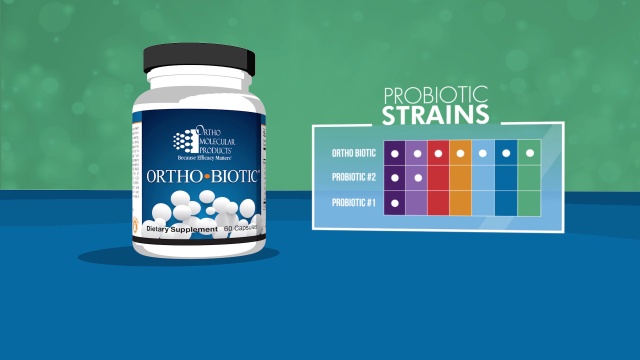

Probiotics Standard vs. Best
Why Would I Need A Probiotic Supplement?
Our bodies host an army of good bacteria that help prevent and fight infections, and help us with proper digestion. The bacteria and other microbes dwelling in our gut is called our microbiome. Under ideal circumstances we host these microbes with good nutrition, and add diversity to our bacterial army by eating cultured and fermented foods as part of our healthy diet.
Many diseases, as well as chemicals like antibiotics, can disrupt our healthy microbe balance and a probiotic supplement is suggested.
• Infections/Antibiotic use: Our microbiome is an important defense against infection. Using antibiotics twice within 90 days is highly damaging to our microbiome. If you struggle with frequent infections you should include a probiotic with your daily immune supplement regimen.
• Diabetes: Our microbiome helps us digest our food. High sugar levels disrupt the microbiome. This may cause some of the gut symptoms and yeast infections people with diabetes experience. Not only can a probiotic restore the microbiome, a healthy microbiome also helps us with better digestion and sugar metabolism.
• Low Stomach Acid: Stomach acid is the first defense against harmful bacteria entering through our mouth. People without stomach acid (for example--people who take proton pump inhibitor drugs like omeprazole or Nexium) are at increased risk of serious colon infections and pneumonia. After you become ill is not the right time to play defense. Consider using a probiotic regularly.
• Other Conditions: Probiotics can help reduce symptoms of irritable bowel disorder, ulcerative colitis, etc. Some people prone to vaginal or urinary infections find probiotics reduce the frequency. Talk to your provider to see if probiotics should be part of your care plan.

Why Take Probiotics With Antibiotics?
Antibiotics kill bacteria, both harmful bacteria that are causing an infection and good bacteria that keep us healthy. Good bacteria are important for proper digestion and skin. Eliminating them causes antibiotic side effects like diarrhea and yeast infection. Taking a probiotic with an antibiotic can replace good bacteria.
Probiotics are a good idea for anyone taking an antibiotic. We especially recommend probiotics if:
• You are taking a broad-spectrum antibiotic (kills off more types of bacteria)
• You take acid-reducing PPI medication (increases risk of diarrhea and colon side effects)
• You have already taken antibiotics in the past 90 days
• You tend to get vaginal yeast infections from antibiotics
What Am I Looking For When Selecting A Probiotic?
1. Variety: Choose a probiotic with multiple strains of bacteria, especially if using longer than 30 days. Studies suggest that chronic use of a single-strain probiotic may actually decrease the diversity of your microbiome.
2. Strength: Look for at least 15 billion CFU
3. Stability: Probiotics are living organisms. Unfortunately, many national brands have the full labeled strength when manufactured but lose potency on the shelf. One popular brand solves the problem by refrigeration, but that is inconvenient for many people to store or remember.

What Probiotic Does Hometown Pharmacy Recommend?
We recommend OrthoBiotic. It contains 7 strains of beneficial microbes, is 20 billion CFU strength, and uses a special technology to stay effective at room temperature. That is the science, but we have heard from patients with digestive challenges how much better they feel with OrthoBiotic than with previous brands they tried. Those real-world stories are another reason we recommend OrthoBiotic at Hometown Pharmacy.
• High quality, shelf stable, best variety of good bacteria.
• Excellent defense against antibiotics AND the preferred choice for daily use.
• Kids’ version= Florabites Gummies

Florajen Vs. Orthobiotic
1. Florajen Probiotic (Orange Box)
• Requires refrigeration. Loses potency at room temperature and may be inactivated if taken with hot foods like soup or coffee
• Not recommended for long term, since a single strain supplement may decrease colon bacteria variety over time. May be used for a short term with an antibiotic.
2. Florajen3 Digestion (Blue Box)
• Compared to OrthoBiotic, it is weaker, needs refrigeration, and only 3 strains
• However, it has been clinically studied in some colon diseases and some providers recommend this brand specifically.

Yogurt Vs. Orthobiotic
Cultured and fermented foods are a good part of a healthy diet to consume more natural good bacteria. But I don’t recommend yogurt as a treatment to counteract antibiotic side effects. Why? Many other probiotic supplements are not much stronger than yogurt. The price per bottle may be lower, but they are a poor value $ per CFU and they are often not manufactured to high quality standards.
• Added sugars and extra calories - Did you know a serving of Yoplait yogurt has more sugar than a serving of Lucky Charms?!
• Calcium interferes with some antibiotics
• Yogurt only has about 500 million to 1 billion CFU (good bacteria measurement) per serving. A good supplement gives you 15-40 times as much!
• Yogurt may seem like a lower cost option, but you would pay over $70 for Yoplait yogurt to total as much probiotic power in one bottle of OrthoBiotic!

On The News I Heard Probiotics Are Useless. Is That True?
Last summer you may have heard a headline like this: “American Gastroenterological Association does not recommend the use of probiotics for most digestive conditions,” with reporting suggesting they are unnecessary. Let’s look deeper into that.
What was the basis for this story? This was not a new study. The researchers did a deep analysis into previous studies and trials of 8 diseases to ask, Is there enough evidence to recommend probiotics as a part of the standard treatment plan for these conditions? And if so, is there any probiotic brand/formula better than others?
The questions the researchers were asking included ones like these:
• Can probiotics treat or prevent C. difficile infections? (C. difficile is a serious colon side effect that can be caused by antibiotics or acquired in the hospital)
• Can probiotics bring or maintain remission, either with, or instead of, standard Rx therapy, in Crohn's disease or ulcerative colitis?
• Should probiotics be used to treat healthy children with diarrhea?
• Probiotics are currently recommended for IBS--can we prove which probiotic brands are most likely to decrease abdominal pain?
While the study did not recommend changing the official treatment guidelines for any diseases, the study notes there are potential benefits, especially from multi-strain probiotics and probiotics that include S. boulardii, and providers continue to recommend them to patients.
Ask your local Hometown Pharmacist about what probiotic is right for you.
The views expressed in this article/blog post reflect those of the author and are intended for educational purposes only. This information should not take the place of medical advice. Hometown Pharmacy Partnerships (HPP) and any organization with a business relationship with HPP are not responsible for the outcome of any decision made based on the information presented in this article/blog post. Please check with your health care provider(s) prior to starting any new dietary, movement and/or wellness strategies.
Pharmacist & Partner: Algoma Hometown Pharmacy and Kewaunee Hometown Pharmacy
Learn more about me and my pharmacies by visiting their pages here:
Algoma Hometown Pharmacy
Kewaunee Hometown Pharmacy


.jpg?ext=.jpg)





Comments